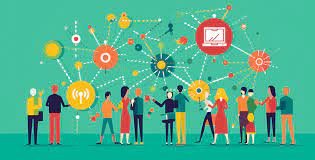Explaining the impact of Technology for traditional industries
The impact of technology for traditional industries and business models is undeniable. From increased efficiency and productivity

In an era characterized by rapid Technology for traditional industries, the impact of technology on traditional industries and business models cannot be overstated.
From manufacturing to healthcare, finance to agriculture, virtually every sector has witnessed a profound transformation brought about by innovations in technology.
In this blog post, we will explore the multifaceted ways in which technology has reshaped traditional industries and revolutionized business models.
Increased Efficiency and Productivity
One of the most significant impacts of technology on traditional industries is the substantial increase in efficiency and productivity. Automation, artificial intelligence (AI), and data analytics have streamlined processes, reduced human error, and accelerated production cycles.
For example, in manufacturing, the adoption of robotic automation has not only improved precision but also led to cost savings through reduced labor requirements. Similarly, AI-driven algorithms have optimized supply chain management, ensuring timely deliveries and minimal wastage.
Enhanced Customer Engagement
Technology has revolutionized the way businesses interact with their customers. With the proliferation of smartphones and the internet, companies now have more channels than ever to engage with their audience.
Social media, mobile apps, and online customer service platforms enable businesses to build stronger relationships with their customers. Moreover, personalized marketing driven by data analytics allows companies to tailor their offerings to individual preferences, increasing customer satisfaction and loyalty.
Innovative Product Development
Traditional industries have evolved by embracing technology to develop innovative products and services. For instance, the automotive industry has seen a shift towards electric and autonomous vehicles.
The integration of sensors, GPS, and connectivity features has made cars safer and more convenient. Similarly, in the healthcare sector, wearable devices and telemedicine applications have not only improved patient care but also opened up new revenue streams for healthcare providers.
Globalization and Market Expansion
Technology has broken down geographical barriers, enabling businesses to tap into global markets. E-commerce platforms, for example, have allowed even small retailers to reach customers worldwide.
This expansion of market reach has not only increased sales opportunities but has also fostered cross-cultural exchange and competition. Traditional industries are no longer confined to local or regional markets, but instead, they can go global with relative ease.
Data-Driven Decision Making
Data has become a valuable asset in the digital age. Businesses across various sectors are leveraging big data analytics to make informed decisions. Traditional industries have shifted from gut feeling and intuition-based decision-making to data-driven strategies.
This enables them to identify trends, customer preferences, and operational inefficiencies, allowing for continuous improvement and better outcomes.
Disruption and Adaptation
In some cases, technology has disrupted traditional industries to such an extent that established business models have had to adapt or face obsolescence. Take, for example, the music industry.
The advent of digital music and streaming platforms completely transformed how music is distributed and consumed. Traditional record labels had to adapt by embracing digital distribution methods and exploring new revenue streams.
Cost Reduction and Sustainability
Advancements in technology have also contributed to cost reduction and sustainability efforts. Renewable energy technologies have made significant strides in reducing the reliance on fossil fuels, leading to a more sustainable energy sector.
Additionally, businesses have adopted green technologies to reduce their carbon footprint and appeal to environmentally conscious consumers. This not only benefits the planet but also helps companies save on energy costs in the long run.
New Business Models
The traditional concept of business models has evolved with the rise of technology. Subscription-based models, peer-to-peer platforms, and the gig economy have all emerged as viable alternatives to traditional employment and business structures.
Companies like Airbnb and Uber have disrupted the hospitality and transportation industries, respectively, by leveraging technology to create innovative business models that connect service providers directly with consumers.
Challenges and Concerns
While the impact of technology on traditional industries has been overwhelmingly positive, it has also raised concerns and challenges. One major concern is the potential for job displacement due to automation.
As businesses adopt technology to streamline operations, certain jobs may become obsolete, requiring workers to acquire new skills and adapt to changing employment landscapes.
Cybersecurity is another pressing concern, as the increased reliance on digital systems has made businesses more vulnerable to cyberattacks. Protecting sensitive data and ensuring the privacy and security of customer information have become paramount in the digital age.
In conclusion, the impact of technology on traditional industries and business models has been nothing short of transformative.
From increasing efficiency and productivity to fostering globalization and innovation, technology has reshaped the business landscape across various sectors. While challenges and concerns persist, the overall trajectory is one of progress and adaptation.
Traditional industries that embrace technology and continuously evolve their business models are likely to thrive in the digital age, setting the stage for a future marked by innovation and opportunity.
What's Your Reaction?
















